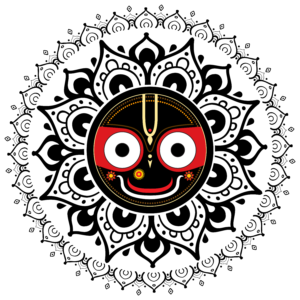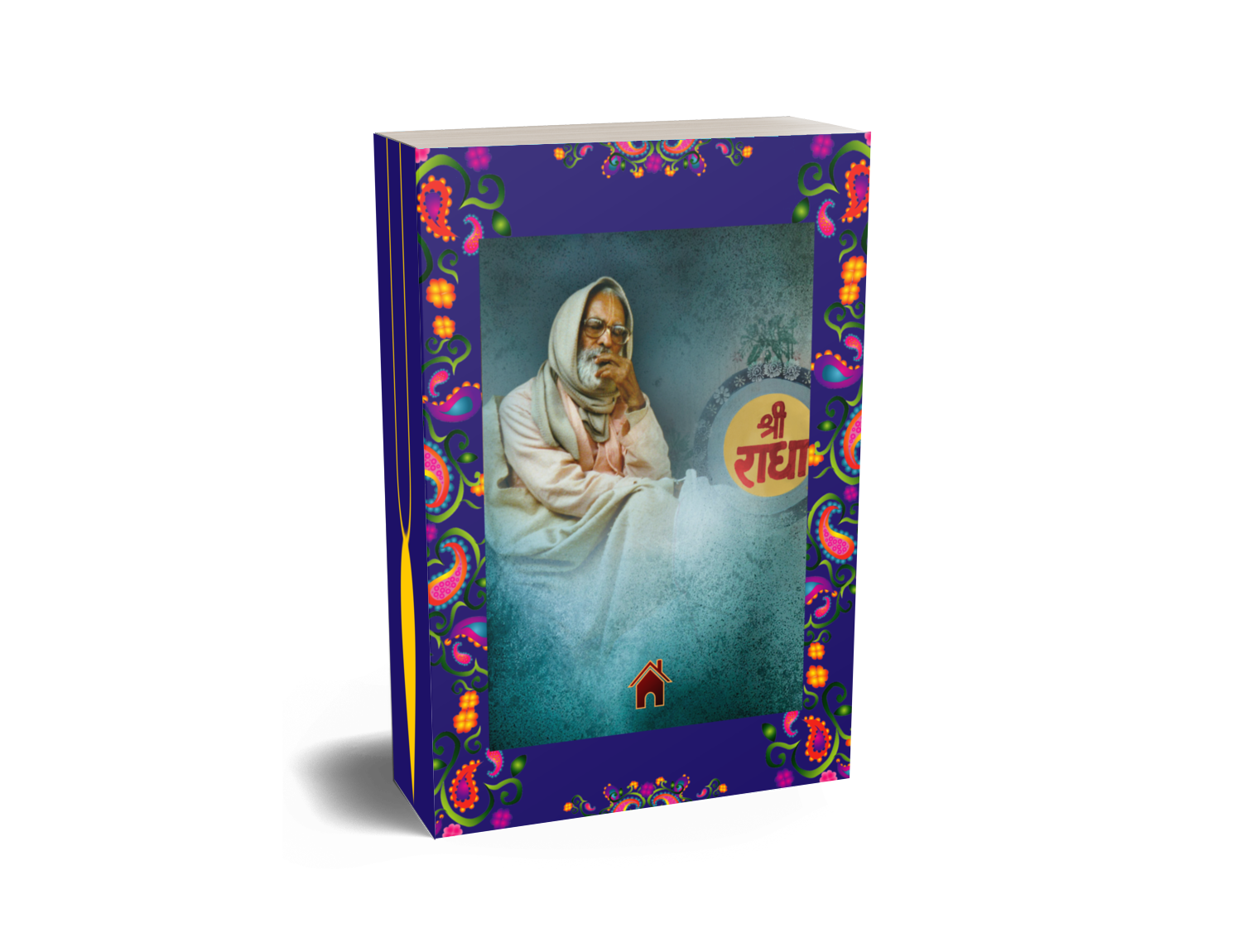

Chapter Twelve from the book, Bhakti-rasāyana, 4th edition by Śrīla Bhaktivedānta Nārāyaṇa Mahārāja
Droṇa and Dharā’s receiving Brahmā’s boon of having parental love for Kṛṣṇa is similar to Kṛṣṇa’s receiving the 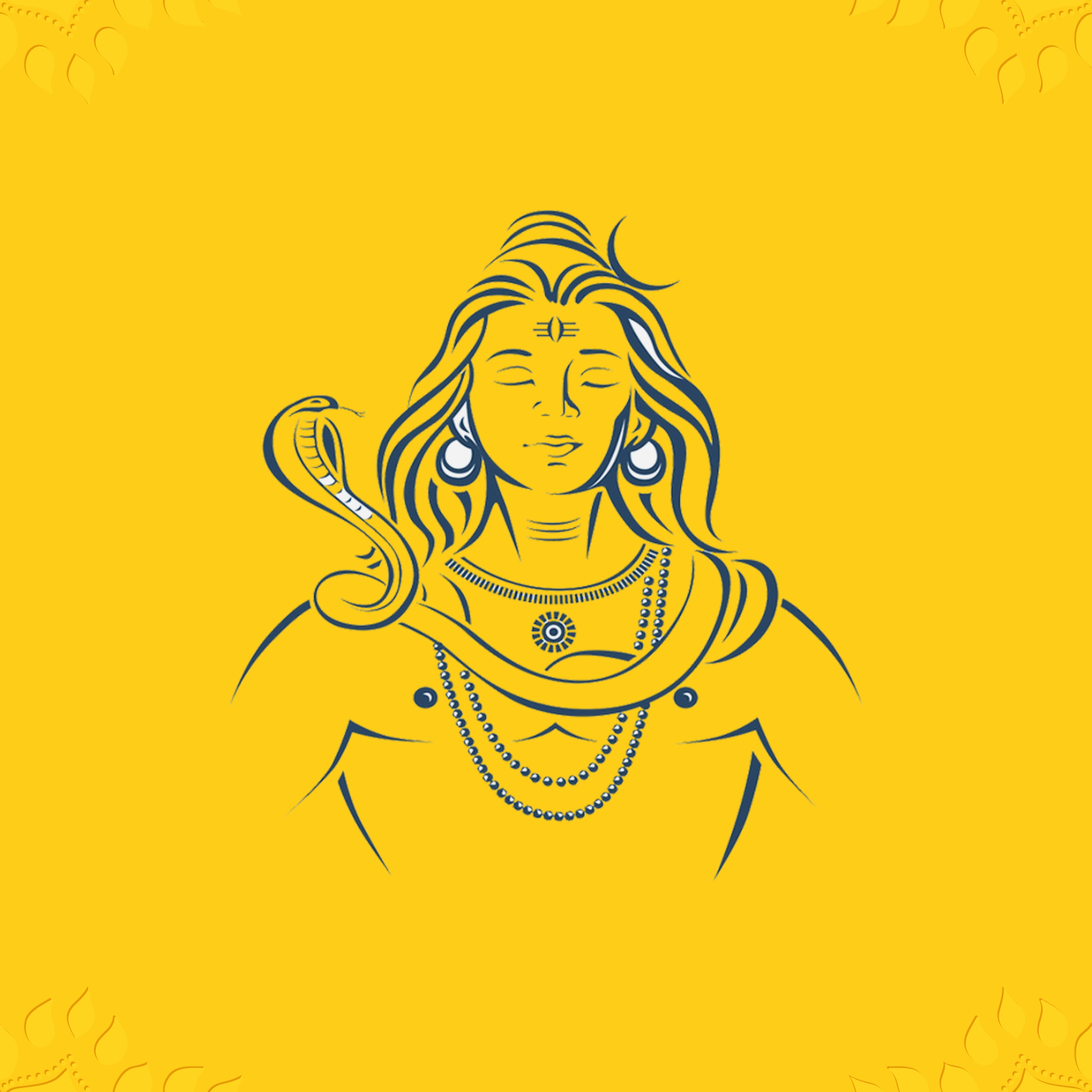 boon from Lord Śiva of having Sāmba as His son. At that time in Dvārakā, Kṛṣṇa performed austerities to instruct people that by worshipping Śiva, material wealth could be obtained. In reality, no one can be Kṛṣṇa’s son – Pradyumna, Aniruddha, Sāmba – they are all Bhagavān’s plenary portions, but they appeared in the forms of His sons. Yaśodā and Nanda Bābā are the eternal parents of Kṛṣṇa, but for showing that some austerities are necessary to attain love for Kṛṣṇa, the boon was given to Droṇa and Dharā. All of the Vaikuṇṭha incarnations are plenary portions of Nārāyaṇa, and similarly, Droṇa and Dharā, Vasudeva and Devakī, Daśaratha and Kauśalyā, and Kaśyapa and Aditi are all expansions of Nanda and Yaśodā. Still, amongst all of the eternal associates of Bhagavān, the eternal associates of Kṛṣṇa are the best.
boon from Lord Śiva of having Sāmba as His son. At that time in Dvārakā, Kṛṣṇa performed austerities to instruct people that by worshipping Śiva, material wealth could be obtained. In reality, no one can be Kṛṣṇa’s son – Pradyumna, Aniruddha, Sāmba – they are all Bhagavān’s plenary portions, but they appeared in the forms of His sons. Yaśodā and Nanda Bābā are the eternal parents of Kṛṣṇa, but for showing that some austerities are necessary to attain love for Kṛṣṇa, the boon was given to Droṇa and Dharā. All of the Vaikuṇṭha incarnations are plenary portions of Nārāyaṇa, and similarly, Droṇa and Dharā, Vasudeva and Devakī, Daśaratha and Kauśalyā, and Kaśyapa and Aditi are all expansions of Nanda and Yaśodā. Still, amongst all of the eternal associates of Bhagavān, the eternal associates of Kṛṣṇa are the best.
nandaḥ sva-putram ādāya
pretyāgatam udāra-dhīḥ
mūrdhny upāghrāya paramāṁ
mudaṁ lebhe kurūdvaha
Śrīmad-Bhāgavatam (10.6.43)
[O Mahārāja Parīkṣit, best of the Kurus, Nanda Mahārāja was very liberal and simple. He immediately took his son Kṛṣṇa on his lap as if Kṛṣṇa had returned from death, and by formally smelling his son’s head, Nanda Mahārāja undoubtedly enjoyed transcendental bliss.]
nandaḥ sva-putram ādāya
proṣyāgatam udāra-dhīḥ
mūrdhny avaghrāya paramāṁ
mudaṁ lebhe kurūdvaha
Bṛhad-bhāgavatāmṛta (2.7.128)
When magnanimous Nanda returned from Mathurā, he took his own son Śrī Kṛṣṇa on his lap and experienced immense pleasure by repeatedly smelling His head.
Previously Nanda Bābā was very detached from worldly life, but after Kṛṣṇa was “born”, he became spellbound 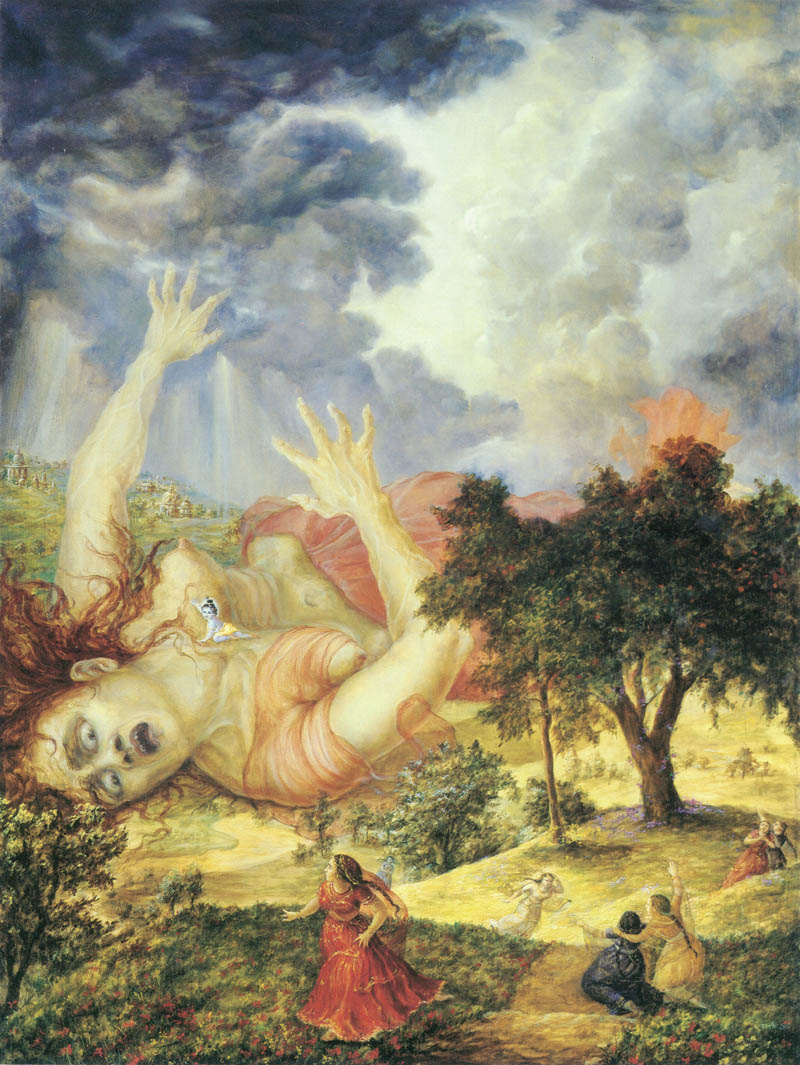 in attachment for Him. Before Kṛṣṇa’s birth, Nanda Bābā never had any need to go to Kaṁsa’s kingdom. But after His birth some money was necessary for His sustenance, and for this reason Nanda went to Mathurā. There he spoke to Vasudeva, who told him, “Please, you must return to Gokula quickly! The demons will now create a disturbance in all directions! Kaṁsa is determined to see that all children born within the last ten days are killed. Therefore please return quickly!” As Nanda was returning to Gokula, he saw the massive corpse of Pūtanā beside the road, and being frightened for Kṛṣṇa’s welfare, he hurried home.
in attachment for Him. Before Kṛṣṇa’s birth, Nanda Bābā never had any need to go to Kaṁsa’s kingdom. But after His birth some money was necessary for His sustenance, and for this reason Nanda went to Mathurā. There he spoke to Vasudeva, who told him, “Please, you must return to Gokula quickly! The demons will now create a disturbance in all directions! Kaṁsa is determined to see that all children born within the last ten days are killed. Therefore please return quickly!” As Nanda was returning to Gokula, he saw the massive corpse of Pūtanā beside the road, and being frightened for Kṛṣṇa’s welfare, he hurried home.
Arriving there and seeing that Kṛṣṇa was all right, it was as if his very life had returned to his body. His previous feelings of detachment could not remain. Taking Kṛṣṇa on his lap, magnanimous Nanda Mahārāja time and again smelled his son’s head, saying, “Bhagavān has saved You from great danger!” Then he heard from his brother Upananda and others how the rākṣasī Pūtana took Kṛṣṇa on her lap and forcibly put her breast in His mouth. She had applied poison to her breast, so how could Kṛṣṇa possibly have been saved? Next she flew up into the sky because Kṛṣṇa had latched onto her and would not let go, and she was thinking that if she could fly to where Kaṁsa was, Kaṁsa could separate Kṛṣṇa from her. She thought that in one minute only she could arrive there, but instead Kṛṣṇa sucked her breast with such force that He not only drank her poisoned breast milk but sucked out her very life. Hearing how Kṛṣṇa was saved from the hands of death, Nanda’s tears soaked Kṛṣṇa’s body.
In this verse are the words sva-putra, which mean that Kṛṣṇa was Nanda’s own son, and also the word proṣyāgata, which means that Nanda was not the actual father of Kṛṣṇa, but the one who nurtured Him. Most people consider that Nanda Mahārāja was Kṛṣṇa’s proṣyāgata, and that His real parents were Vasudeva and Devakī. Vasudeva brought Kṛṣṇa to Gokula, and there Nanda raised Him. But Nanda Bābā trusted what he saw with his own eyes – that Kṛṣṇa had taken birth from the womb of Yaśodā in his own home. There was no doubt in his mind, but Vasudeva also did not doubt that Kṛṣṇa was his son. But if Kṛṣṇa had taken birth in Nanda’s home, then how could He have had loving affairs with the girls there, who are the daughters of Nanda’s brothers, and therefore would have been Kṛṣṇa’s cousins? How would this be possible? The gopīs are actually His hlādinī-śakti, but He first appeared in Mathurā to prevent the people of this world from saying, “Oh, He is performing the rāsa dance with His own cousins!” So it is said that Kṛṣṇa is really the son of Vasudeva, but this verse refers to Kṛṣṇa as Nanda’s sva-putra, his own son. What could be greater evidence than this? Nandaḥ sva-putram ādāya proṣyāgatam udāra-dhīḥ – with natural, simple-hearted feelings of great fatherly affection, Nanda took his own son on his lap and nurtured Him. Here, the meaning of proṣyāgata is “nurtured”.
After the killing of Kaṁsa, Nanda remained waiting in his Mathurā residence and was feeling very unhappy. He 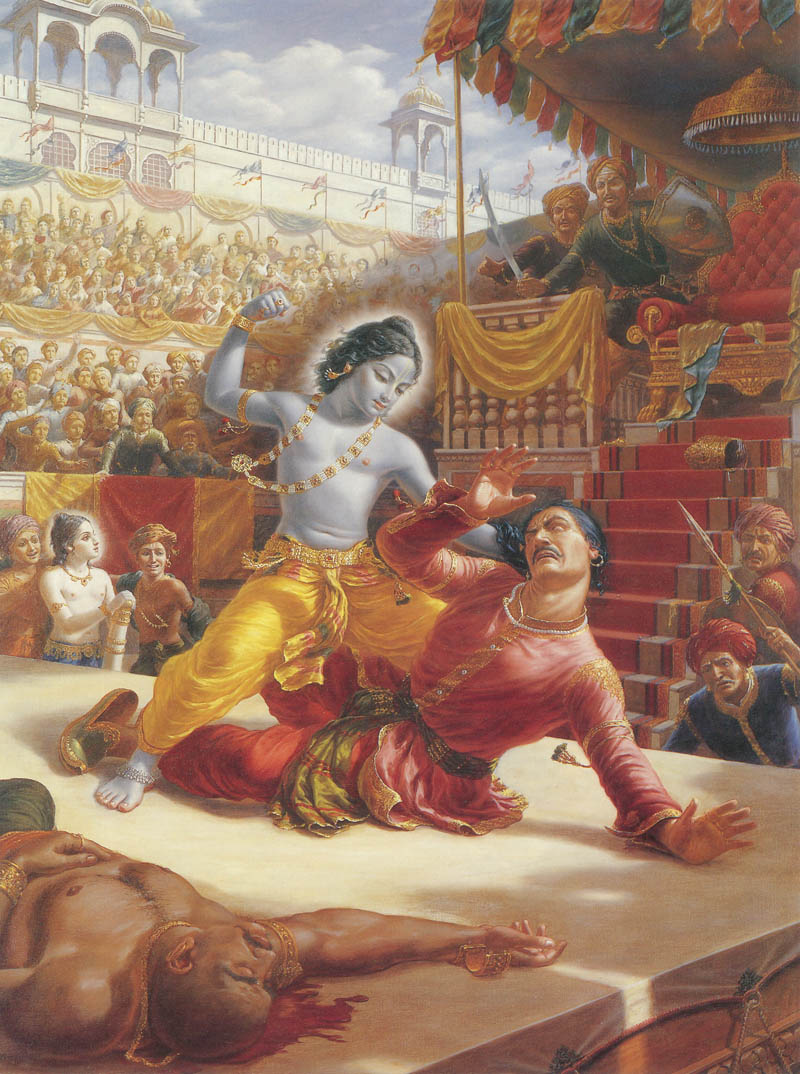 was thinking, “More than twenty-four hours have passed since Kaṁsa was killed, and still neither Vasudeva nor anyone else such as Ugrasena or Akrūra has brought me any news. Kṛṣṇa and Balarāma themselves have also not come; because they are mere children that is alright, but why haven’t any of the others come? I have heard that people are saying that they are actually the sons of Vasudeva.” Because no one went to him with any news, Nanda Bābā was crying in solitude, thinking, “What will I do? Should I go to Vasudeva’s palace to meet him, or what should I do?” Soon after dark, Kṛṣṇa and Baladeva came alone to him. They saw that their father was very sad, with his head hanging down in his hands. Sitting on his lap and lifting his father’s chin, Kṛṣṇa said, “Father, why are you sitting like this, alone and silent?”
was thinking, “More than twenty-four hours have passed since Kaṁsa was killed, and still neither Vasudeva nor anyone else such as Ugrasena or Akrūra has brought me any news. Kṛṣṇa and Balarāma themselves have also not come; because they are mere children that is alright, but why haven’t any of the others come? I have heard that people are saying that they are actually the sons of Vasudeva.” Because no one went to him with any news, Nanda Bābā was crying in solitude, thinking, “What will I do? Should I go to Vasudeva’s palace to meet him, or what should I do?” Soon after dark, Kṛṣṇa and Baladeva came alone to him. They saw that their father was very sad, with his head hanging down in his hands. Sitting on his lap and lifting his father’s chin, Kṛṣṇa said, “Father, why are you sitting like this, alone and silent?”
Looking at Baladeva, Nanda said, “My son, why haven’t you come earlier?”
Baladeva replied, “Father, a very strange thing is happening! Many people are saying that we are actually the sons of Vasudeva, but I don’t accept this. Even if we are the sons of Vasudeva, we don’t know any other father besides you! If for any reason a mother and father renounce a son, then those who raise him are really his mother and father. There are many different kinds of fathers: the one who begets you, the one who raises you, the king, the spiritual master, the father-in-law and the family priest. But amongst them, the best is he who raises and protects you, and therefore I am your son only, and I don’t know any other father besides you. I don’t want to remain here in Mathurā for even one more second; I want to immediately accompany you and Kṛṣṇa back to Vraja!”
Nanda Bābā said, “My son, don’t speak like this! Hearing this, my younger brother Vasudeva will die, and Devakī will also die!” Nanda Bābā said this because he knew that they really would die, and therefore he is more magnanimous than Vasudeva and Devakī, who didn’t care as much about the Vrajavāsīs’ feelings while Kṛṣṇa stayed with them in Mathurā. He said to Baladeva, “Six of their sons were killed, and only with great difficulty were they able to save both of you. If you hadn’t been brought to Gokula, you would have also been slain. Therefore we are forever indebted to Vasudeva, so you remain here! I will take Kṛṣṇa and return to Gokula.”
Baladeva replied, “I will not be without Kṛṣṇa for even one second! I consider you to be my only father, and Kṛṣṇa to be my only brother!”
Then Nanda Bābā looked at Kṛṣṇa because in His childhood Kṛṣṇa had given Nanda so much good advice. He asked Him, “What should I do?”
Kṛṣṇa replied, “Father, may I speak?”
“Yes, please.”
“In My opinion it would not be auspicious for Baladeva Prabhu to go to Vraja, leaving Vasudeva and Mother Devakī in such a difficult situation. And if I go, then he must go also. Therefore if you will permit us, we will stay here for a few days, and then later we will both return together.” What He was saying was having some influence on Nanda Bābā, but Nanda could only remain silent. Kṛṣṇa continued, “I am prepared to go with you now, but then everyone will say, ‘Nanda Bābā is very cruel! Even after all of Vasudeva and Devakī’s children died, he took both Kṛṣṇa and Balarāma away from them and returned to Gokula, leaving them to die also!’ So please don’t do this. Kaṁsa has now been killed, and we just need a few more days to complete our work here by killing all the remaining demons. You please return home.”
Concerning this point, Śrīla Viśvanātha Cakravartī Ṭhākura says that a person will stay with whomever he receives the most affection from, whoever they are. Every jīva, even a dog, is hungry for love. Indeed, Kṛṣṇa could not receive the prema of Vraja anywhere else. He was not able to obtain even a fraction of the love that Yaśodā and Nanda had given Him in either Mathurā or Dvārakā, and the prema that the gopīs had for Him was so pure that He could not find anything like it anywhere else in the entire universe. So giving up that love, He went to Mathurā? Viśvanātha Cakravartī Ṭhākura says, “We don’t have any faith in that. People may say that He left Vraja and went to Mathurā, but that can’t be so! He remained in Vraja in an unmanifest form. No one could see Him, but He was there.
“When Akrūra took Kṛṣṇa and Baladeva on the oxcart to Mathurā, it was actually their expansions in the mode of aiśvarya as the sons of Devakī and Rohiṇī that went to Mathurā. They remained in Vraja in their original forms, but no one knew of it. How was this possible? By the Yogamāyā potency, which makes the impossible possible.” Therefore Kṛṣṇa always remains in Vṛndāvana; this is the special conception given by our Gosvāmīs. If Kṛṣṇa was ever able to actually leave Vraja, then it would mean that the residents there didn’t love Him the most and that Kṛṣṇa didn’t love them the most, and neither of these ideas is possible. Therefore He never leaves Vṛndāvana.
What happened next? Kṛṣṇa began living in Mathurā, and all of the members of the Yadu dynasty returned. Due to fear of Kaṁsa’s atrocities they fled, but after Kaṁsa’s death they returned to Mathurā and began living there again with great happiness. Meanwhile, Astī and Prāptī, the daughters of Jarāsandha who had married Kaṁsa, approached their father bewailing, “Your son-in-law was faultless! They threw him on the ground and killed him even though he did not fight back!” Becoming very angry, Jarāsandha attacked Mathurā seventeen times with very large armies. Kṛṣṇa was thinking, “Should I return to Vraja now?” But He was unable to go because Vasudeva saw that Kṛṣṇa had not been properly educated; He knew only how to take cows out for grazing. So first he wanted to give Kṛṣṇa the saṁskāra of the sacred thread, and for this he called Gargācārya to his home.
Everyone, whether local or from distant places, was invited to the ceremony, but Vrajavāsīs like Nanda and his brother Upananda were intentionally not invited. Taking advice from senior members of the dynasty like Uddhava and Akrūra, Vasudeva and Devakī had decided before in the assembly of Ugrasena that, “If the residents of Vraja are invited here for the ceremony, then the bhāva of Vraja will be stimulated inside Kṛṣṇa and He will certainly desire to return to Vraja with them. If that bhāva awakens inside Him, none of us will be able to check it, and therefore it is better not to invite them.” For the ceremony, Kṛṣṇa had His head shaved, leaving only a śikhā. Wearing wooden sandals and taking a staff, He assumed the full dress of a brahmacārī. Then Gargamuni gave Him the gāyatrī-mantra and the sacred thread, and putting the cloth for begging alms around His neck, said, “My dear son, now beg some alms.” Previously, in Vraja, Yaśodā had told Kṛṣṇa, “When You receive the sacred thread, we will fill Your begging cloth with jewels.” Now Kṛṣṇa remembered that occasion, and in that great assembly He anxiously started looking in all directions, “Where is My mother?” At the ceremony, Devakī was fully decorated in her best attire, sitting in the front to give Kṛṣṇa alms. And Kṛṣṇa was anxiously looking around, “Where is My mother? Where is My mother?” But not seeing her, acute remembrance of Yaśodā 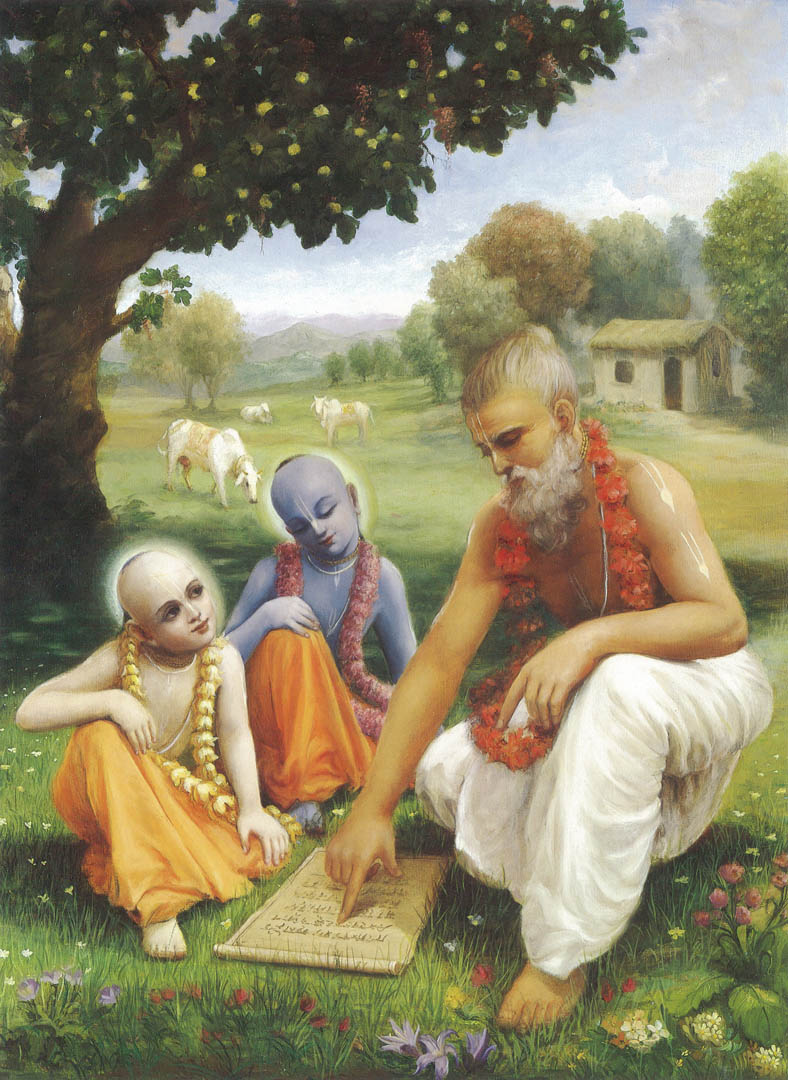 came to Him, and He thought, “My mother, somewhere in Nanda-bhavana, will be standing alone by the door. Sometimes she will be looking inside the house, and sometimes she will be looking outside. She will be crying, not knowing where I am and wondering, ‘What is my son doing at this moment?’ And here I am, accepting this sacred thread amidst a joyous celebration.” Crying out, “Mother! Mother! ” Kṛṣṇa fell to the ground, unconscious. All of the excitement of the occasion and the giving and taking of alms immediately stopped, and everyone ran to Kṛṣṇa and lifted Him. Witnessing this spectacle, the members of the Yadu dynasty said, “Just see how strong His attachment is to Vraja! He should be sent far away for His education! He should be sent to Ujjain, and there He can start strictly following His vows and the instructions of His spiritual master. He will stay there as long as the guru sees fit, and then upon returning here, His nature will have changed, and He will understand that He is really the son of Vasudeva.” So they sent Him there.
came to Him, and He thought, “My mother, somewhere in Nanda-bhavana, will be standing alone by the door. Sometimes she will be looking inside the house, and sometimes she will be looking outside. She will be crying, not knowing where I am and wondering, ‘What is my son doing at this moment?’ And here I am, accepting this sacred thread amidst a joyous celebration.” Crying out, “Mother! Mother! ” Kṛṣṇa fell to the ground, unconscious. All of the excitement of the occasion and the giving and taking of alms immediately stopped, and everyone ran to Kṛṣṇa and lifted Him. Witnessing this spectacle, the members of the Yadu dynasty said, “Just see how strong His attachment is to Vraja! He should be sent far away for His education! He should be sent to Ujjain, and there He can start strictly following His vows and the instructions of His spiritual master. He will stay there as long as the guru sees fit, and then upon returning here, His nature will have changed, and He will understand that He is really the son of Vasudeva.” So they sent Him there.
Somehow the Vrajavāsīs came to know of all this and said, “Considering Him to be their own son, they have given Him the sacred thread? Forcibly they have made Him a kṣatriya through the sacred thread ceremony? And they have cruelly sent Him to Ujjain to receive His education from Sāndīpani Muni? Wearing horizontal markings on his forehead, Sāndīpani Muni is an impersonalist worshipper of Śaṅkara! Why have they sent Kṛṣṇa to him?” Yogamāyā had made the arrangement that Kṛṣṇa be sent to Sāndīpani, because if He had been sent to a Vaiṣṇava, the Vaiṣṇava would have recognised Him. Therefore He was sent to a devotee of Śiva who would not recognise Him, and His identity would not be revealed. Kṛṣṇa was sent to Ujjain, and in sixty-four days He learned sixty-four arts.
When Kṛṣṇa returned from there, He sent Uddhava to Vraja. After speaking with Uddhava, one of the gopīs began speaking to a bee, considering it to also be a messenger from Kṛṣṇa:
api bata madhu-puryām ārya-putro ’dhunāste
smarati sa pitṛ-gehān saumya bandhūṁś ca gopān
kvacid api sa kathā naḥ kiṅkarīṇāṁ gṛṇīte
bhujam aguru-sugandhaṁ mūrdhny adhāsyat kadā nu
Śrīmad-Bhāgavatam (10.47.21)
[O Uddhava! It is indeed regrettable that Kṛṣṇa resides in Mathurā. Does He remember His father’s household affairs and His friends, the cowherd boys? O great soul! Does He ever talk about us, His maidservants? When will He lay on our heads His aguru-scented hand?]
Now that Kṛṣṇa has completed His studies at the āśrama of Sāndīpani, will He be coming here? Certainly He won’t be able to stay in Mathurā! Is He on the road coming here right now? He told Me over two months ago that He would be returning ‘the day after tomorrow’, but still He has not come. Does He ever remember us at any time? Does He remember us as those who string wonderful flower garlands for Him? Does He remember, ‘Oh, the gopīs’ beauty defeats that of even the most beautiful women in the world!’? Does He ever remember us in that way? Or does He remember us even in a derogatory manner? ‘Oh, yes, those gopīs are foolish girls who work with milk products and don’t know anything.’ When He hears a song or sees some dancing, does He remember us and the sentiments we shared, the love of His insignificant dāsīs? When will He return and make us fearless by placing His aguru-scented hands on our heads, and putting His long arms around our necks as He did during the rāsa-līlā?” Similarly, Nanda Bābā and all the residents of Vraja had extremely strong feelings for Kṛṣṇa from His very childhood, and although He didn’t send them any news from Mathurā or Dvārakā, in the end, when it was the appropriate time for Sūrya-pūjā at Kurukṣetra after the war there, without being called, Nanda Bābā, Yaśodā, the gopīs and all the residents of Vraja went there and at last met Him again.
In the verse we are discussing, it says sva-putram. The word sva, meaning “one’s own”, is used because otherwise the word putra could mean that Kṛṣṇa was the adopted son of Nanda. So this verse says, “Taking his own son” – not taking the son of Vasudeva – “he repeatedly embraced and kissed Him.” And because of his great affection for Kṛṣṇa, Nanda experienced paramam, that supreme spiritual ecstasy which even Vasudeva never felt. Another meaning of paramaṁ mudam is that Nanda felt that ecstasy which even Mahā-Lakṣmī, who is worshipful to all devotees, could not attain.
Udāra-dhīḥ – Nanda Bābā was very generous and magnanimous. On the day of Kṛṣṇa’s birth festival, he gave 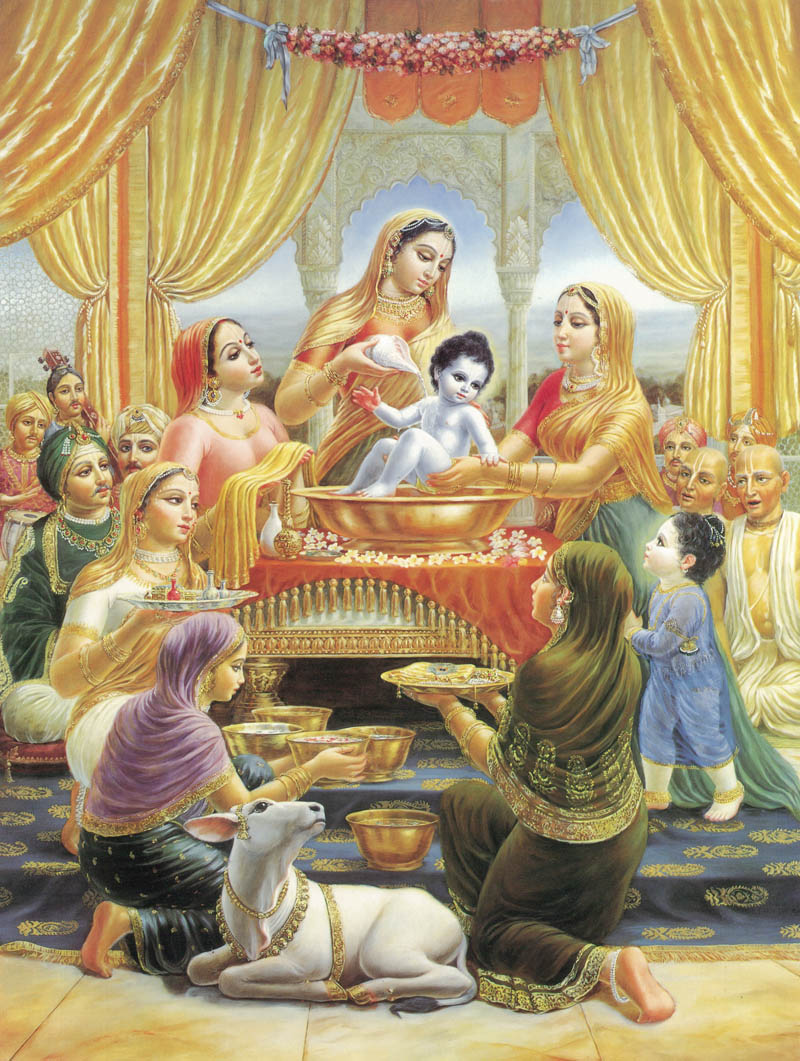 cows, jewels, cloth and everything he had in charity to the brāhmaṇas. Udāra can also mean greatly intelligent. If he hadn’t been highly intelligent, he wouldn’t have asked Brahmā only for the boon of having that most elevated vātsalya-prema for Bhagavān. He didn’t ask for an ordinary son, nor did he even ask to have Bhagavān as his son, but he asked only for bhagavad-bhakti. This is the proper yearning – begging for bhakti, for prema. The ācāryas in our sampradāya don’t consider that obtaining Kṛṣṇa is the ultimate objective; they consider that obtaining kṛṣṇa-prema is the ultimate objective. Especially the kṛṣṇa-prema of the Vrajavāsīs, and within that, especially the prema of the gopīs. And within that, the prema of Rādhā has been emphasised – to have prema for Kṛṣṇa as Rādhā-vallabha.
cows, jewels, cloth and everything he had in charity to the brāhmaṇas. Udāra can also mean greatly intelligent. If he hadn’t been highly intelligent, he wouldn’t have asked Brahmā only for the boon of having that most elevated vātsalya-prema for Bhagavān. He didn’t ask for an ordinary son, nor did he even ask to have Bhagavān as his son, but he asked only for bhagavad-bhakti. This is the proper yearning – begging for bhakti, for prema. The ācāryas in our sampradāya don’t consider that obtaining Kṛṣṇa is the ultimate objective; they consider that obtaining kṛṣṇa-prema is the ultimate objective. Especially the kṛṣṇa-prema of the Vrajavāsīs, and within that, especially the prema of the gopīs. And within that, the prema of Rādhā has been emphasised – to have prema for Kṛṣṇa as Rādhā-vallabha.
Nanda begged only for bhagavad-bhakti, not for having a son. Vasudeva prayed, “We desire a son like You” but Nanda prayed, “We desire to have vātsalya-prema for You.” When Brahmā had offered the boon to Droṇa and Dharā, Droṇa said, “Please first ask my wife what she desires.” Dharā replied, “When Parabrahma Himself takes birth in this world and performs His wonderful human-like pastimes, we desire to have great devotion for Him.” Both a mother and father will love their son, but the mother will love him more. The mother actually nurtures the child, while the father provides all the necessities such as clothing and food. If during the night the father’s sleep is broken by the child’s crying for even one moment, he may desire to even put the child outside of the house! But the mother will stay awake all night if necessary feeding the child milk, comforting him and lulling him back to sleep. The mother is ready to face any hardship, and therefore she looks after the child in a way that is not possible for the father.
Nanda once went to Mathurā to meet with Vasudeva concerning the taxes which had to be given to Kaṁsa, and one full day elapsed before he returned to Vraja. But Yaśodā couldn’t tolerate being away from Kṛṣṇa for even one moment, and therefore Yaśodā’s affection for Kṛṣṇa was greater than that of Nanda. When Uddhava visited Vraja, Nanda Bābā was able to converse with him a little, but Yaśodā could not. She couldn’t possibly have spoken in her condition; she was simply lying on the ground nearby and bitterly weeping.
When Brahmā stole the cowherd boys and calves, Kṛṣṇa assumed all of their forms for one year and drank the 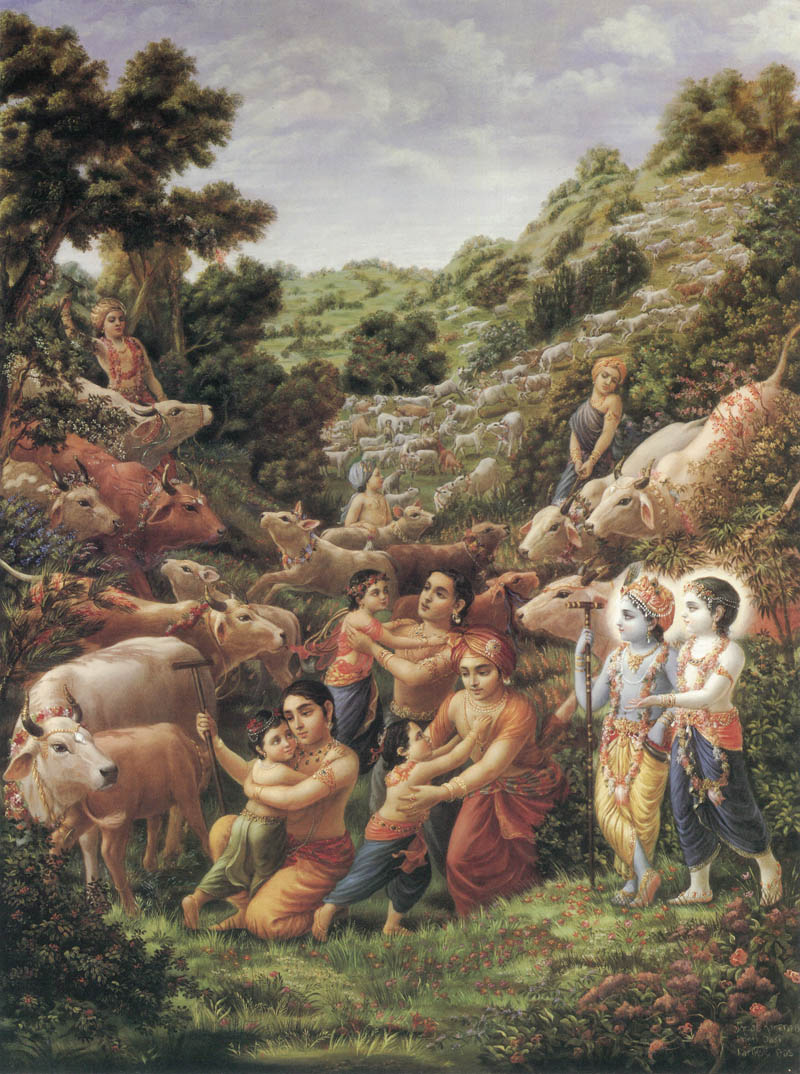 milk of the motherly gopīs and cows. Describing the glories of those motherly gopīs and cows is very difficult, so what to speak of describing the glories of Yaśodā? With great prema she fed Kṛṣṇa milk for the entire time He was residing in Vṛndāvana, and her glories are unlimited and unfathomable. If someone attains even a small particle of bhakti for Kṛṣṇa, then they feel that their lives have become completely fulfilled. So what to speak of Yaśodā? I don’t know if we even dare to attempt to describe her bhakti.
milk of the motherly gopīs and cows. Describing the glories of those motherly gopīs and cows is very difficult, so what to speak of describing the glories of Yaśodā? With great prema she fed Kṛṣṇa milk for the entire time He was residing in Vṛndāvana, and her glories are unlimited and unfathomable. If someone attains even a small particle of bhakti for Kṛṣṇa, then they feel that their lives have become completely fulfilled. So what to speak of Yaśodā? I don’t know if we even dare to attempt to describe her bhakti.
After Kṛṣṇa left Vṛndāvana for Mathurā, Mother Yaśodā stopped doing all housework. The kitchen remained unclean, all the pots were upside-down and there were cobwebs everywhere. Who would she cook for? When Kṛṣṇa was present, with great delight she would cook for Him, but she felt that with Kṛṣṇa gone there was no one to cook for. She began displaying the characteristics of someone who is approaching old age, and on one very hot afternoon, when she was feeling particularly unhappy, remembrance of so many of Kṛṣṇa’s childhood pastimes began coming to her, and she was at once submerged in bhāva. Inside the house were Kṛṣṇa’s clothing and many of His toys, like toy cows and tiny bamboo flutes. She collected all of these in a cloth sack and leaving the house, began to walk away. Then one of her friends who lived nearby approached her and said, “Sakhī, where are you going?” Seeing that she was going somewhere, others gathered around her and asked, “Mother, where are you going?” Previously she was unable to even speak; whenever she would desire to speak, she would just become choked up with emotion and could only cry. But now she said, “I am going to wherever my Kanhaiyā is.”
“What? Where is your Kanhaiyā? This is Nandagrāma, and He is in Mathurā! It is an extremely hot afternoon, the hot sun is bearing down, and the ground will certainly burn your feet, so how will you go anywhere?”
“I cannot live without Him.”
“So going to Mathurā, then what will you do?”
“I will go there, and arriving in the reception room, I will say, ‘I desire to meet Queen Devakī.’ And if someone brings me to Devakī, then I will fall at her feet and say, ‘I will become your maidservant birth after birth. I will serve your child – He is not my child – and I will cook for you both. I will become your maidservant for all time. Please keep me in your palace, where I will eat only your remnants and always serve you. That is all I desire.’” Saying that, she became overwhelmed with emotion and fell right there; she had that much love for the Lord as  her son!
her son!
The Vraja devotees have the highest level of love for Kṛṣṇa. Their love never comes and goes as the love in this world does; they are all eternal associates of Kṛṣṇa, and their prema is like a fathomless ocean. On rainy days, even though the rivers swell and flow even stronger towards the ocean, the ocean itself never swells. And on dry days it never diminishes; so for the fathomless ocean, swelling and diminishing never occur. It is the same with the love of these devotees, and Nanda and Yaśodā’s prema for Kṛṣṇa is always taking new and variegated forms.
Source: Purebhakti.com
Image(s) made possible by Pixabay.com, Krishnapath.org and/or Bhaktiart.net
Unless indicated differently, all verse translations and quotes are from the books by Śrīla Prabhupāda (Vedabase.com)